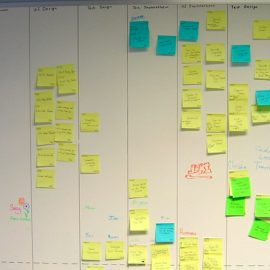

This article is an excerpt from the Shortform book guide to "13 Things Mentally Strong Parents Don't Do" by Amy Morin. Shortform has the world's best summaries and analyses of books you should be reading.
Like this article? Sign up for a free trial here.
Do you expect perfection from your child? How much responsibility should children carry? What are effective forms of discipline?
Managing expectations for parents and children can be difficult. Sometimes, what seems like the obvious course of action isn’t the most effective.
Continue reading for advice from psychotherapist Amy Morin.
Managing Expectations and Consequences
Several of Morin’s tips relate to managing expectations for parents and children, and setting appropriate consequences for when those expectations aren’t met. In this article we’ll discuss:
- Why perfectionism does more harm than good
- Why your child needs the freedom to make mistakes
- Why responsibilities are necessary for a child’s growth
- The difference between punishment and discipline
Mentally Strong Parents Aren’t Perfectionists
One of Morin’s tips for parents is not to expect—or worse, demand—perfection from their children.
Morin clarifies that having high expectations is healthy; high expectations will push your child to do their best, and build their self-esteem by letting them know what you believe they’re capable of. However, perfectionism has the opposite effect: It sets impossible standards that will discourage and frustrate your child. Even worse, if you expect perfection, you might inadvertently teach your child that mistakes are unacceptable; that any mistake will lead to punishment and rejection. Therefore, it’s important to push for greatness, but not perfection.
The author adds that mentally strong parents understand that their kids aren’t going to excel at everything they do. So rather than push their kids to be the best at everything, they focus on helping them do the best they can do. One simple-yet-effective practice is to praise the child’s efforts, rather than their results—this teaches the child that it’s important to always try their hardest, even if it might not lead to the results they’re hoping for.
For instance, suppose your child struggles with math (as many people do). Even after putting in honest effort and getting extra help at school or home, perhaps they still get a B in math class. A mentally strong parent would recognize that the B was the best they could do, and is therefore a praiseworthy grade; a perfectionist parent would scold and punish the child for not earning an A, further damaging their self-esteem.
Mentally Strong Parents Don’t Let Their Children Avoid Responsibility
Morin says that another key part of setting reasonable expectations is to teach your child responsibility from a young age, both in the sense of handling responsibilities and taking responsibility for their actions.
First, it may be tempting to let your child have as much free time as possible rather than burdening them with chores on top of their schoolwork. However, Morin says mentally strong parents understand that having such responsibilities from a young age sets children up for success later in life; children who grow up doing chores tend to be harder workers, more self-reliant, and more empathetic than those who are allowed to spend their childhoods doing whatever they want.
Therefore, the author recommends assigning your child chores that are appropriate for their age and holding them accountable for those tasks (we’ll discuss appropriate consequences in the next section).
Second, Morin says mentally strong parents expect their children to solve their own problems (within reason), rather than letting them get away with blaming others and thereby avoiding responsibility. This will sometimes lead to situations in which your child has to take responsibility for solving problems that weren’t their fault; unfortunately, life isn’t always fair, and your child must be prepared for that.
Also note that taking responsibility includes taking responsibility for interpersonal problems. This is important because children need to practice solving conflicts with each other on their own, instead of always looking to adults for help—doing so will allow them to develop problem-solving skills that they’ll need as they grow up, when there won’t always be an authority figure nearby to step in for them.
Mentally Strong Parents Don’t Take Shortcuts to Avoid Discomfort
Morin adds that, along with teaching their kids responsibility, mentally strong parents take responsibility themselves by avoiding shortcuts and quick fixes to parenting problems. This is because, if your child sees you taking such shortcuts, they’ll learn that it’s OK to shirk responsibility and take the easy way out. Confronting and solving such challenges will be exhausting at times, but the more consistently you choose the best solution over the easiest solution, the more your child will do the same.
For instance, if your child is throwing a tantrum and refusing to do their chores, the easy solution might be to just send them to their room and do the chores yourself. However, in doing so, you’d teach your child that they can escape their responsibilities and that tantrums are an effective tactic for doing so.
Similarly, Morin says that you might be tempted to find quick solutions to stress and emotional outbursts—for example, buying your child a new toy to appease them or taking the family out for dinner to take their minds off their problems for a little while. Like the previous example, these are short-term answers that will backfire in the long run because your child will learn to avoid difficult and uncomfortable situations instead of confronting them.
| Counterpoint: There May Be a Deeper Problem Morin says that you shouldn’t give in to your child’s bad behavior and shouldn’t let them get out of their responsibilities. However, it’s important to note that sometimes such misbehavior is a symptom of an underlying problem that the child doesn’t understand or can’t articulate. For instance, they might be struggling with an undiagnosed condition such as ADHD and not getting the support they need. In such cases, the best solution is to uncover and address that problem; continuing to push through it as Morin suggests would actually be the easy short-term solution. Mental health experts suggest considering factors such as the duration, intensity, and age-appropriateness of a child’s behaviors to decide if a formal evaluation might be helpful. For example, it’s normal for a toddler to scream and cry over just about anything, but if a five-year-old is having daily meltdowns, it could indicate a deeper issue such as autism. It may also help to consult with a medical professional and rule out physical health problems; if that five-year-old is suffering from chronic pain, suddenly the screaming and crying seem much more reasonable. |
Mentally Strong Parents Don’t Mistake Punishment for Discipline
So far we’ve discussed how to set reasonable expectations for your child. However, no matter how reasonable your expectations are, there will be times when your child doesn’t live up to them. That’s when it’s crucial to impose appropriate consequences, with emphasis on “appropriate.”
Morin says that mentally strong parents make sure those consequences discipline their children instead of just punishing them. The key difference is that discipline teaches children how to do better, whereas punishment just makes them suffer. For example, if your child gets angry and yells at you, an appropriate consequence might be to send them to their room until they calm down—this teaches them that they can walk away from upsetting situations instead of lashing out and making things worse. On the other hand, an unhelpful punishment might be to take away something that makes them happy, like their favorite toy; far from teaching your child how to handle their anger, this approach will just upset them even more.
The author adds that effective discipline uses positive consequences (rewards) as well as negative ones. So, while you might have to send your child to their room for yelling at you, make sure to also praise them when they handle their anger more appropriately, such as by walking away to settle down. Some other appropriate rewards might include giving your child an allowance for doing their chores each week or giving them a piece of candy as a reward for a good grade on a test.

———End of Preview———
Like what you just read? Read the rest of the world's best book summary and analysis of Amy Morin's "13 Things Mentally Strong Parents Don't Do" at Shortform.
Here's what you'll find in our full 13 Things Mentally Strong Parents Don't Do summary:
- Thirteen common mistakes that parents make and how to avoid them
- How certain mistakes can derail even the best parents
- The difference between punishment and discipline, and which one makes kids suffer






